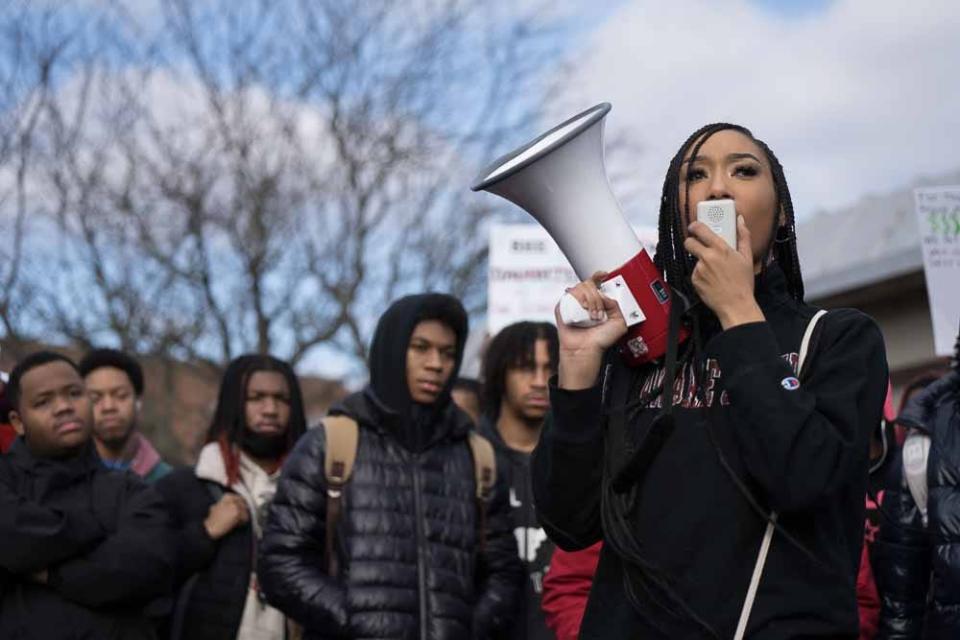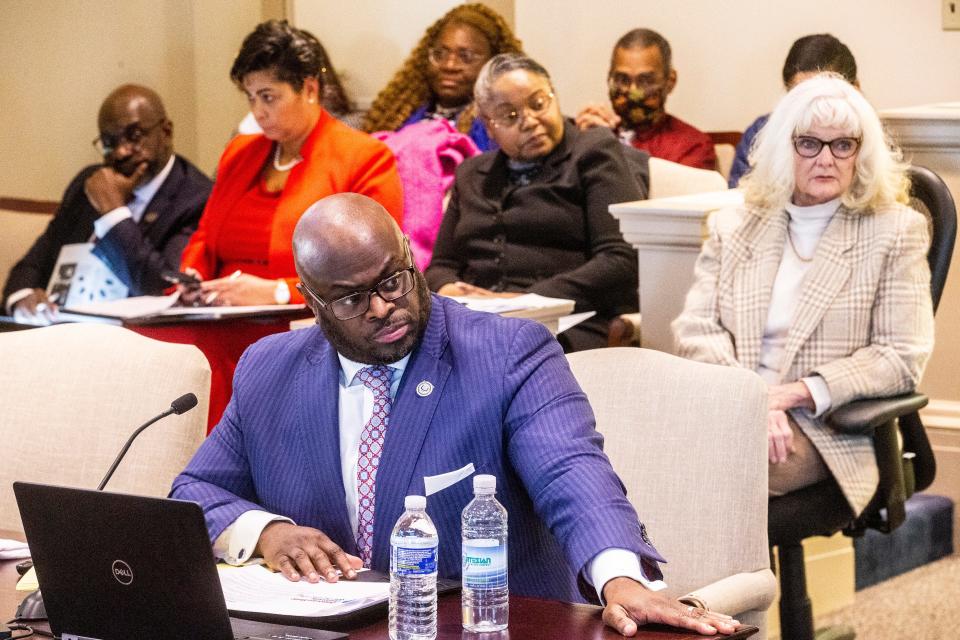Enough with free-speech limits at Delaware State. President Allen, please fix it | Editorial
Editor's note: On Friday, March 17, Delaware State University President Tony Allen announced that the university had dropped its requirement that community members participating in the Safe Space Coalition sign non-disclosure agreements. The announcement followed the publication of this editorial and additional news reporting from DelawareOnline/The News Journal.
They marched. They yelled. They wept.
They demonstrated with energy, concern and anger.
Students at Delaware State, it was clear, had had enough.
They demanded changes to how the historically Black land-grant university handles public safety and cases of sexual assault.
As staff writer Kelly Powers has reported over weeks now, frustrated Delaware Students have kept their concerns and their anger at the forefront, speaking at a series of meetings and at a state budget hearing on funding for their alma mater — and in headlines across the First State and beyond.
We credit the students for their passion and their convictions — commitments to public safety and appropriate handling of sexual assault cases should be basic expectations on the Dover campus.
Seemingly, too, they made progress.
Delaware State launched the Safe Space Coalition, a group comprising nine steering committees, each tasked with tackling different parts of university policies that pertain to how sexual assault cases are handled and how public safety strategy is devised and executed.
But, as Powers reported this week, there was a catch:
The university required any student who wished to join the coalition to sign a confidentiality agreement. More than 100 members, Powers reported, were effectively stripped of their rights to free speech. Students, parents, community members and employees make up this coalition.
Delaware Online/The News Journal obtained a copy of the non-disclosure agreement’s language, which, bar signers from sharing “any and all information related to [their] participation” for fear that “such willful and unauthorized disclosure violates university policy [and] will be grounds for adverse action.]
Put simply: What?
A publicly funded state university, grappling with an engaged and seriously concerned student body on critically important policy related to student safety, wants to muzzle volunteers who want to act in good faith to improve campus culture.
That’s right: Delaware State apparently wants to cloak a process that should be steeped in transparency — an earnest effort to reconsider important policies about sexual assault and public safety — through non-disclosure agreements.
It’s stunning. It’s outrageous.
And university officials confirmed their position to us in a statement.
"We need everybody to be on the same page and respect the privacy and confidentiality of what we're doing," Carlos Holmes, director of news services, told DelawareOnline. "Once the committees come to decisions with respect to actions that will be taken, or measures that will be implemented, then that will be shared with the campus community."
Earlier:Delaware State makes students sign NDAs to work on new coalition for campus safety
Funding secured:What a $300K grant for Delaware State University aims to address after student protests
A stunning rebuke of the First Amendment
Alex Morey, an attorney and journalist who advocates for student and faculty rights on campus across the nation through her work as director of campus rights advocacy for the Foundation for Individual Rights and Expression, an organization dedicated to free speech and thought in higher education governance, expressed grave concerns about the DSU decision to require NDAs for participants in the Safe Space Coalition.
“It's another level of troubling that they would have students purport to sign away their rights — their expressive rights under the First Amendment — to talk about these issues that are going on, that are clearly of major public concern,” Morey said. “What Delaware State is doing here is really putting these students in an incredibly difficult position,” she said. “Because they're saying we'll let you help us work to use government resources to fix this incredibly important problem — but you can't talk about it.”
Morey’s right. This is another level of troubling.
And sadly, it’s a level we may well have predicted. After all, as Powers has reported, officials in Dover have kept a tight lid on the aspects of the fallout that followed the initial demonstration on Jan. 18.
University officials — public employees working for a public institution that purports to support the public trust — escorted members from the press from a community-wide town hall meeting following the protest. Subsequent meetings were closed to the press — just as they were last fall after a shooting on campus.
Dynah Mosley, a student leader and advocate at DSU, shared our lack of surprise about the non-disclosure forms.
“If we can’t be open and honest about what we’re doing, what’s the point?” Mosely, a junior, asked.

Mike Brickner, executive director of ACLU’s Delaware chapter, also shares our concern.
Brickner, who has been monitoring student unrest at DSU for months, called the NDAs “a sledgehammer to swat a fly” — an apt description of the wild overreaction here that represents a massive breach of the public trust.
“This is a vent that has essentially cut off that pipeline of public information,” Brickner said.
What needs to happen

To move forward with speed, President Tony Allen, who pledged to address student concerns in a February op-ed published by Delaware Online/The News Journal, must scrap the non-disclosure for members of the Safe Space Coalition. The coalition’s activities should be as transparent as possible — meetings and meeting minutes should be public and made available to the press.
Our elected officials — Gov. John Carney, members of the General Assembly and members of the Delaware State University Board of Trustees, chaired by Dr. Devona E. G. Williams — must honor their commitments to the public trust and see that participation in the Safe Space Coalition does not require any compromise of the ironclad right to free speech.
This article originally appeared on Delaware News Journal: Delaware State Safe Space Coalition non-disclosure agreements must go

